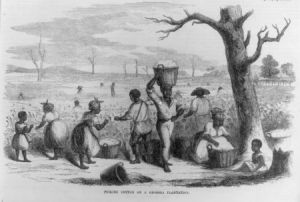 In Virginia, the fighting resumes on the second day of the Battle of the Wilderness. Casualties again number in the thousands during a long day of bloody but inconclusive clashes. During the fighting, both sides fail to take advantage of opportunities that might have shifted the battle’s momentum. By nightfall, both Union and Confederate forces are buttressed with reinforcements.
In Virginia, the fighting resumes on the second day of the Battle of the Wilderness. Casualties again number in the thousands during a long day of bloody but inconclusive clashes. During the fighting, both sides fail to take advantage of opportunities that might have shifted the battle’s momentum. By nightfall, both Union and Confederate forces are buttressed with reinforcements.
As the firing fades away into the night, General Robert E. Lee‘s Army of Northern Virginia is entrenched in strong defensive positions. Union General Ulysses S. Grant is left pondering whether to continue the fight on the morrow, or maneuver to a more advantageous location.
While Lee and Grant clash this day in the war over black slavery, today’s Georgia Baptist Christian Index publishes an editorial, one of hundreds by now, condemning the ungodly abolitionist beliefs and actions of Northern Christians.
The great fault of prosecuting this remorseless war against our rights, returns to scourge the North. All accounts agree in representing the morals and religion there as many degrees worse than it was a year ago, when (in the language of the Louisville “True Presbyterian”), “ministers who shamelessly boasted of valuable books and manuscript sermons in their libraries, stolen from libraries of the ministers of the South, preached to fashionable Christians who, in dresses stolen from Southern ladies and in parlors adorned with vases, pictures and statuary stolen from Southern homes, danced upon stolen carpets to the music of stolen pianos.” As a sample of these accounts, take the following from the “Daily News,” New York: “The cost of the commonest necessities of life is becoming frightful for the poor; and the enormous superabundance of paper money is stimulating extravagance and speculation to the maddest recklessness; every element of demoralization is at work to corrupt the people; public virtue appears to have sold itself, and private integrity and even chastity are besieged by the tempting and unprecedented allurements. The whole people, in fine, appear to have enjoined hands in an infamous saturnalia of blood and moral or physical debauchery. The very Capital of the Republic has become but a gigantic brothel, where lewd and desperate women scarcely rival, in their shameless way, the moral prostitution of the Legislative and Executive Chambers!”
With this voice echoing in the ear, one can hardly withhold his assent from the view elaborated by Rev. Mr. Hall, in a lecture on “The Historic Significance of the Southern Revelation,” delivered, last night, before the Young Men’s Christian Association of Richmond. We are urging–so that gentlemen told his audience–a grand protest, the first in history, against philosophical infidelity and disorganizing wrong. Through influences flowing from the material atheism of the older and later French schools, the Northern mind has come to regard its own institutions as the rule of right and wrong, superceding and rejecting revelation: as illustrated by the bold avowal of Henry Ward Beecher, that “if the God of the Bible was the God of slavery, he would help to dethrone him!” The Utilitarian moral philosophy also has taught the Northern mind to accept the individual and public welfare as its legitimate end, the attainment of which no order of society and no Constitution should be allowed to prevent; according to the pithy remark of John Randolph, that ‘New England had borrowed its ethics from Paley and the Jesuits!’ These are the forces precipitating armed legions upon us for the overthrow of our vested political rights and our scriptural domestic institutions….
The concern with “stolen” Southern goods seems rather odd when white Southerners for decades have been enriching themselves off the stolen labor of African slaves, enslavement of the black race being the South’s “scriptural domestic institution.” As to comparing Northern Christians to whores, the writer ignores the long standing and all-too-common practice of slave owners holding their young female slaves as sexual hostages, raping them at will and fathering thousands, if not tens of thousands, of mulatto children.
Soldiers are not the only ones wandering around in the wilderness this day!
Even as the rhetoric of white supremacy drones on endlessly and passionately in the pages of the Index and other Baptist papers of the South, not all readers are fooled by the hyperbole. More and more poor whites, tired of fighting and championing a rich man’s war and increasingly concerned about securing daily food and shelter, are tuning out the propaganda of the elite. Blacks may be inferior, but there is no sense in keeping them enslaved if it harms white folks.
In the ungodly North portrayed by the Index writer, Christianity is actually doing quite well. For Baptists white and black, the fight for liberty for all persons is viewed as consistent with the freedom message preached by Jesus in the Gospels. Even as many Baptist churches of the North struggle in light of the absence of many of their male members, congregational life remains bright.
In Indiana the First Baptist Church of Vincennes, founded in 1862, serves as an example of a struggling yet growing Northern (American) Baptist congregation. Persevering in spite of the times, the congregation today dedicates its first church house, a “white wood frame building,” at a cost of $6,000.
Sources: Battle of the Wilderness (link) and (link); “Mercer University,” Christian Index, May 6, 1864; “The History of First Baptist Church of Vincennes, 1862-2010” (link)


